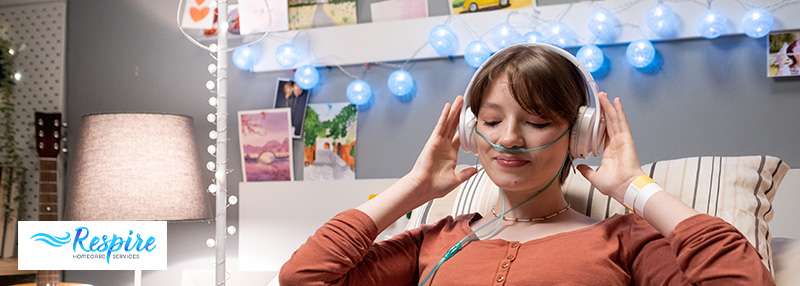Respire
Updated Wed September 25, 2024
Published Under: Oxygen Concentrator

Understanding Oxygen Therapy
Oxygen therapy is a treatment that provides supplemental oxygen to individuals who have difficulty getting enough oxygen on their own. Conditions like chronic obstructive pulmonary disease (COPD), pulmonary fibrosis, and severe asthma can impair the lungs’ ability to oxygenate the blood effectively. Oxygen therapy increases the amount of oxygen in the bloodstream, helping to alleviate symptoms like shortness of breath, fatigue, and confusion, and improving the overall quality of life.How an Oxygen Concentrator Works
An oxygen concentrator is a medical device that extracts oxygen from the surrounding air and delivers it in a concentrated form to the user. Unlike traditional oxygen tanks that store a finite amount of oxygen, concentrators draw from the endless supply of ambient air, making them more convenient and sustainable.Here’s how it works:
- Air Intake: The oxygen concentrator pulls in ambient air from the surrounding environment. This air contains approximately 21% oxygen, along with nitrogen and other gases.
- Filtration and Compression: The concentrator then filters out dust, pollen, and other impurities. The air is compressed and passed through a series of molecular sieves—special filters that trap nitrogen molecules, allowing only oxygen to pass through.
- Oxygen Concentration: As the nitrogen is removed, the remaining oxygen is concentrated to about 90-95%. This concentrated oxygen is then delivered to the user through a nasal cannula or mask.
- Delivery to the Patient: The concentrated oxygen is provided at a continuous flow rate or in pulse doses, depending on the user’s needs. The user inhales this oxygen-rich air, which helps to increase the oxygen levels in their blood.
Benefits of Using an Oxygen Concentrator
Oxygen concentrators offer several advantages over other forms of oxygen delivery systems, such as compressed oxygen tanks or liquid oxygen:- Unlimited Oxygen Supply: Because concentrators draw oxygen from the air, there’s no need to worry about running out of oxygen or refilling tanks. This makes them particularly useful for long-term oxygen therapy.
- Portability: Many modern oxygen concentrators are designed to be portable, allowing users to maintain their mobility and independence. Portable oxygen concentrators (POCs) are lightweight, battery-operated, and can be used at home, on the go, or even during air travel.
- Cost-Effective: Over time, oxygen concentrators can be more cost-effective than other oxygen delivery methods because they don’t require regular tank refills or deliveries.
- Ease of Use: Oxygen concentrators are user-friendly, with simple controls and displays that make it easy to monitor oxygen flow and battery life. Some models even come with advanced features like remote monitoring and alerts.
- Environmentally Friendly: Since oxygen concentrators do not rely on stored oxygen, they reduce the need for frequent deliveries and the associated carbon footprint, making them a greener option for oxygen therapy.
Who Can Benefit from an Oxygen Concentrator?
Oxygen concentrators are commonly prescribed for individuals with a variety of respiratory conditions, including:- Chronic Obstructive Pulmonary Disease (COPD): COPD is a group of lung diseases that block airflow and make breathing difficult. Oxygen therapy can help alleviate the symptoms and improve the quality of life for people with COPD.
- Pulmonary Fibrosis: This condition causes scarring of the lung tissue, leading to reduced oxygen absorption. An oxygen concentrator can help maintain adequate oxygen levels in the blood.
- Asthma: Severe asthma attacks can lead to dangerously low oxygen levels. Oxygen therapy can be used in conjunction with other treatments to manage symptoms.
- Heart Failure: In cases where heart failure affects the lungs’ ability to oxygenate blood, oxygen therapy can help reduce strain on the heart and improve symptoms.
- Sleep Apnea: Some individuals with sleep apnea may require supplemental oxygen during sleep to maintain healthy oxygen levels.
Choosing the Right Oxygen Concentrator
When selecting an oxygen concentrator, it’s important to consider factors such as the user’s oxygen needs, lifestyle, and mobility. At Respire, we offer a range of oxygen concentrators, including portable options that allow users to stay active and engaged in their daily lives. Our knowledgeable team is here to help you choose the best device for your needs, ensuring that you receive the highest quality care and support.Breathe Better with Respire Healthcare
An oxygen concentrator is a life-changing device for individuals with respiratory conditions, providing a steady supply of oxygen that improves their quality of life and supports their overall health. At Respire, we’re committed to offering the best in oxygen therapy solutions, helping you breathe easier and live better.If you’re considering oxygen therapy or need assistance choosing the right oxygen concentrator, contact Respire today. Our team is here to support you every step of the way.
Comments